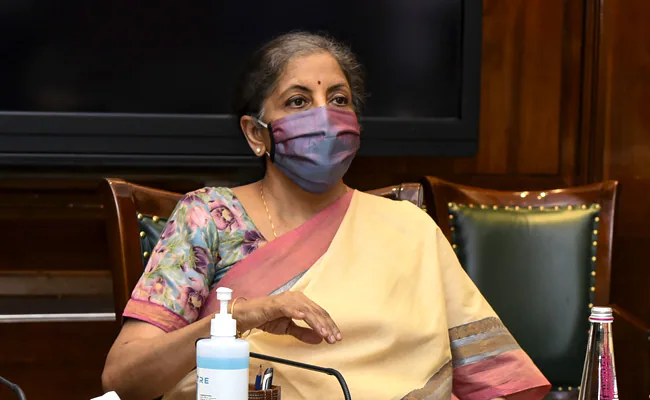Parliament Passes Bill To Set Up National Bank For Financing Infrastructure and Development

[ad_1]
The bank will support the development of long-term non-recourse infrastructure financing
Parliament on Thursday passed a bill to set up the National Bank for Financing Infrastructure and Development (NaBFID) to fund infrastructure projects in the country, with Finance Minister Nirmala Sitharaman asserting that its audited accounts will be placed before both the Houses every year and they will have “oversight” of the institution. Rajya Sabha passed the National Bank for Financing Infrastructure and Development (NaBFID) Bill, 2021 by voice vote on Thursday. The bill was passed in Lok Sabha on Tuesday.
Participating in a debate on the bill, some members raised the issue of lack of parliamentary oversight of the institution and demanded that the proposed legislation be sent to a select committee for scrutiny. Replying to the debate, Finance Minister Nirmala Sitharaman explained, “Every year audited accounts (of this bank) will come to each House of Parliament….so Parliament oversight (of the institution) is in-built in the bill.”
Section 26 of the bill provides, “The Institution shall furnish to the Central Government and the Reserve Bank within four months from the date on which its accounts are closed and balanced, a copy of its balance-sheet and accounts together with a copy of the auditor’s report and a report of the working of the Institution during the relevant year, and the Central Government shall, as soon as may be after they are received by it, cause the same to be laid before each House of Parliament.”
Thus, the development finance institution, called the National Bank for Financing Infrastructure and Development (NaBFID), will be answerable to Parliament. The bank will support the development of long-term non-recourse infrastructure financing in India, including development of the bonds and derivatives markets necessary for infrastructure financing and to carry on the business of financing infrastructure.
Sitharaman explained that a five-year tax break is provided to private development finance institutions under the bill to ensure enhanced flow of funds and, thereafter, they should be smart enough to become competent. “The Act (bill) gives space to private institutions to come up for which we give tax benefits for first five years and for this institution (NaBFID), we are giving tax benefits for 10 years,” she told the House.
She further told the House, “We have provided an authorised capital of Rs 10 lakh crore. Rs 20,000 crore has been given as equity and Rs 5,000 crore has been given as grant. Sovereign guarantee has been provided. This institution will be able to access the line of credit from RBI,” she said. She further explained that on the financial side it will lend for infra projects and more importantly, it will establish a credible framework for both equity and debt investment.
She said that the 2019 budget had the announcement of Rs 100 lakh crore investment for infrastructure over the next five years and by that year-end, the government came up with a national infrastructure pipeline which had 700 projects all related to infrastructure. This is not just for building roads and bridges but is also for social infrastructure like hospitals and schools, she added.
She said that development finance is highly risky and takes a long time as gestation periods are long, and it also needs a higher credit cost to be included. “It is not as if we are dependent on FDI (foreign direct investment) or sovereign fund,” she said, adding that it will establish a credible framework for both equity and debt investment.
“It will attract investment from both domestic and global institutional investors as we as domestic retail investors. We are not depending on just FDIs,” she told the House. About the ownership of NaBFID, she said, “The government’s stake will start from 100 per cent but eventually long time later it will be brought down to 26 per cent. But, there will always be 26 per cent presence of the government at all times. It will be professionally run and the government will only appoint the chairman. Other appointments will be done by the Banks Board Bureau and not by the government.”
She stressed that all the safeguards have been provided in the bill. In her 2019-20 budget speech, Sitharaman had proposed a study for setting up DFIs for promoting infrastructure funding. About 7,000 projects have been identified under the National Infrastructure Pipeline (NIP) with a projected investment of Rs 111 lakh crore during 2020-25.
NIP, a first-of-its-kind initiative to provide world-class infrastructure across the country and improve the quality of life for all citizens, will be crucial for attaining the target of becoming a $5 trillion economy by Financial Year 2025. Participating in the debate, several opposition members demanded that the bill be sent to a select committee as it lacked adequate provisions for accountability and oversight.
Narain Das Gupta of the AAP said the bill should be sent to a select committee. He pointed out that there are no provisions of accountability or oversight and asked why a new bank was being created when similar institutions have “failed in the past”. Congress leader Jairam Ramesh rued that the bill was not sent to a standing committee of Parliament for scrutiny.
Ramesh outlined the long history of development financial institutions in the country, and talked about IDBI, ICICI, and NABARD, among others. Terming the bill “very ambitious”, he said NaBFID would be a government company and huge resources are going to be mobilised, and yet there is no external oversight, external surveillance, or external monitoring.
Jharna Das Baidya of the CPI(M) demanded that the government set out a structural financial mechanism for this as similar institutions such as ICICI, IDBI and IFCI were set up earlier as well. She said the current bill does not have adequate provisions for accountability to the stakeholders and the public at large.
[ad_2]
Source link

